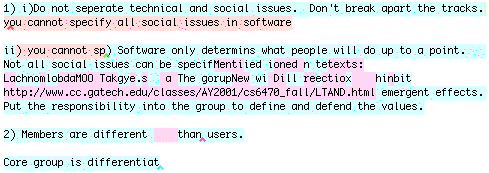Subscribe to this blog in Radio: 
Didn't find what you were looking for?
E-mail this blog's author, Bruce
Umbaugh:  |
|
 |
Saturday, April 26, 2003 |
Dave has posted the Abstract
for his May 9 talk at Dartmouth.
7:10:35 AM  |
|
Online
Anonymity Comes Under Fire. Verizon's loss in a court battle to
keep an ISP customer's identity out of the music industry's hands
will make it harder for people to stay anonymous online, privacy
advocates say. By Katie Dean. [Wired
News]
I've been worrying about this. Talked about it yesterday with a
friend in the context of fighting spam, too. The future of anonymity
is a worthy topic to ponder.
6:54:42 AM  |
|
 |
Friday, April 25, 2003 |
Lessig: have
you sent your check to EFF today?.
I have just finished reading the opinion by Judge
Wilson dismissing MGM's suit against Grokster and Streamcast. The
opinion is testimony to great lawyering. The key to the decision
is the difference between the architecture of Napster and the
architecture of Morpheus. To get a judge to understand that
completely takes an extraordinary skill. This was not a case I
worked on at all, so I am free to say this: EFF deserves a great deal of
credit in this case. As Kapor said at its founding, "Architecture
is politics." Now it also law.
8:35:33 PM  |
|
Judge:
File-swapping tools are legal. A federal judge in Los Angeles
has handed a stunning court victory to file- swapping services
Streamcast Networks and Grokster, dismissing much of the record
industry and movie studios' lawsuit against the two companies.
By John Borland, CNET News.com.
In an almost complete reversal of previous victories
for the record labels and movie studios, federal court Judge
Stephen Wilson ruled that Streamcast-- parent of the Morpheus
software--and Grokster were not liable for copyright infringements
that took place using their software. The ruling does not directly
affect Kazaa, software distributed by Sharman Networks, which has
also been targeted by the entertainment industry.
Defendants distribute and support software, the users of
which can and do choose to employ it for both lawful and unlawful
ends, Wilson wrote in his opinion, released Friday.
Grokster and StreamCast are not significantly different from
companies that sell home video recorders or copy machines, both of
which can be and are used to infringe copyrights.
. . .
We feel strongly that those who encourage, facilitate and
profit from piracy should be held accountable for actions,
MPAA spokeswoman Marta Grutka said. We're hoping that people
aren't taking this as an invitation to continue along the path of
what is clearly illegal activity.
We are reviewing the decision, and we intend to appeal,
said a representative for the Recording Industry Association of
America (RIAA).
. . .
[T]he judge's surprise ruling marked the first validation of an
argument that file- swapping supporters have been making since
Napster's first controversial arrival. Peer-to-peer file-trading
is a technology that can be used for activities well beyond
copyright infringement, and the technology should not be blocked
altogether to stop solely its illegal uses, these backers have
said.
In making that argument, the judge looked back to the landmark
1984 Supreme Court ruling that upheld the legality of Sony's
Betamax videocassette recorder. That decision helped establish the
doctrine of "substantial noninfringing use," which protects
technology providers that distribute products--like the VCR or
photocopier--that can be used for both legal and illegal purposes.
We are absolutely very proud of this judge for having the
unusual capacity to be able to grasp the technology and its future
benefit to taxpayers and shareholders around the world, said
Wayne Rosso, president of Grokster. Technology is usually way
ahead of courts and legislature. The fact that judge was able to
acutely comprehend (this technology) is a credit to the legal
system.
You can also read the summary
judgment order.
4:14:40
PM  |
|
You can vote for Benjamin
Mathes, of Webster University, to win CBS' ''Soap Star of
Tomorrow'' contest.
2:14:24
PM  |
|
Two kinds of ''regime change
playing cards'' now available:
- The most-wanted Iraqi leaders cards, available for small fees
on eBay and the like, or downloadable
here in pdf, but also
- a playing
card deck for US regime change (pdf, too) from GATT.org, which says:
The TRO, estimating that the U.S. governing regime
is no longer consistent with world peace or prosperity, hopes
that the playing cards will show the way to regime change and,
eventually, large- scale war crimes proceedings.
. . .
Many of those featured on the "55 most wanted" cards are in
government, and removing these people from power would go a long
way towards making the world a safer place.
Others include corporate CEOs; in those cases, the
corporations themselves must be dissolved or otherwise rendered
incapable of further harm.
If one day the people on these cards are indeed brought to
justice, 'just following orders' or 'supporting our troops' will
be no excuse for the rest of us, said TRO spokeswoman Hedwig
Ixtabal- Mono.
2:14:20 PM  |
|
I just did an interview for KMOV television (CBS affiliate,
channel 4) on spam e-mail, especially the "local
boy made good" being prosecuted by the FTC for sending
deceptive, unsolicited commmercial e-mail. The story, in which I may
say something terribly clever for five seconds, or not, is slated to
air on the fice- or six-o'clock newscasts here in St. Louis this
evening. So, St. Louisans, set your VCRs and ReplayTVs.
12:14:02 PM  |
|
DirecTV
mole to plead guilty, by Kevin Poulsen, SecurityFocus (in The
Register).
A 19-year-old University of Chicago student accused of
leaking the secrets of DirectTV's most advanced anti-piracy
technology to hacker websites has agreed to plead guilty to
violating the rarely used 1996 Economic Espionage Act.
Igor Serebryany is scheduled to appear Monday in federal court
in Los Angeles to enter a guilty plea, as part of a plea agreement
reached between defense attorneys and prosecutors last week,
lawyers for both sides confirmed Wednesday. The plea deal does not
stipulate a sentence, which will be governed by federal
guidelines, according to the prosecutor in the case.
. . .
Serebryany's job gave him access to the internal technical
secrets of the newest version of the smart card, the so-called
"P4" card, that DirecTV had begun distributing to subscribers, and
which satellite hackers were nowhere near conquering. As described
by the FBI, the company closely guards those details with security
procedures that rival a defense contractor -- confidentiality
agreements, high-power encryption, "need to know" access, and an
air-gapped computer network. Whenever a writing references
DirecTV's P4 technology, it must be printed on specific colored
paper so it can be easily identified on sight, thereby decreasing
possible theft of that writing, wrote the FBI of one of the
company's precautions.
According to court records, the student began smuggling
digitized copies of the papers out of the law firm on CD ROMs, and
e-mailing them pseudonymously to the underground. Only a small
percentage of the stolen data made its way to public websites, and
none of it has yet inspired a successful hack against the cards.
My personal feeling was he was just kind of a young kid,
impressionable, that made a mistake, says "Risestar," a
British Columbia man who runs the satellite hacking site
PirateDen.com, which received, but apparently did not publish,
some of the documents. He thought he was helping people out and
he didn't weigh into account the results of his
actions. (thanks, ISN!)
10:13:42 AM  |
|
SARS
Scare in Toronto.
While caution is advisable, there is no need yet to
close down the city of Toronto, W.H.O. notwithstanding.
. . .
. . . . Our own sense is that while there is a plausible
rationale for W.H.O.'s recommended travel ban, the C.D.C. has
taken the more sensible approach in simply urging caution. At
least for now, it looks safe for Americans to travel to Toronto
without fearing that they will come into contact with SARS
patients. That judgment could change, of course, if
epidemiologists find the disease spreading deeper into the city.
[New
York Times: Opinion]
6:18:09 AM  |
|
Verizon
Must Reveal Song Swappers. A federal judge rejects a
constitutional challenge Thursday by Verizon Communications. Barring
a reversal of an earlier ruling, Verizon will have to turn over
names of two Internet subscribers suspected of illegal file trading
to the Recording Industry Association of America. [Wired News]
6:09:41 AM  |
|
 |
Thursday, April 24, 2003 |
Hack the Planet: Using Hydra to collaboratively take
notes (or just watch people take notes) is fun (and sometimes just
funny).

9:47:45
PM 
|
|
Esther Dyson has started
blogging.
I saw somewhere that William
Gibson had stopped. There's no such announcement on his blog,
though it hasn't been updated all week. Maybe that's what "stopped"
means.
3:09:01
PM  |
|
Microsoft CD copy
protection advances, by John Borland, CNET News.com.
We're hopeful that the labels will do some test
releases this summer and do some major releases this winter,
said Adam Sexton, vice president of marketing for Macrovision's
music technology division. Copy protection is working in
Europe, and airplanes are not falling out of the sky. The economy
is still functioning, despite the doomsday
predictions. Interesting embrace-and-extend in all
this: Macrovision has been using an encrypted MP3 format rather than
Microsoft's Windows Media Audio. Here comes your digital rights
management, baby, and it's all up to Redmond.
12:08:00 PM  |
|
Salon Blogs have the best names.
With no pretense of or even gesture towards completeness, but just
glancing at the recent updates:
12:07:55 PM  |
|
We've planted a Wild Plum tree at
home, part of a school-surprise, more-or-less-Arbor-Day related
project made possible by the local Men's Gardening Club. Without
warning, my daughter carried this plastic newspaper bag of wood
shavings, roots, and twig out from school about ten days ago.

I know that only a fraction of the kids in her class must really
have planted them. Notice might have helped with cooperation. But we
picked a spot in the yard and dutifully dug a hole that evening.
Since, two buds are leafing, so I guess good things are happening.
(These photos are not of our tree, by the way!)

The info the Garden Club sent home said that it was a Wild Plum,
but not much more. I guess it's probably Prunus americana.
Though I've also seen reference to Prunus mexicana looking
online, I would guess that the Gardening Club was more likely to be
passing out the native plant than something from farther out of town
-- as mexicana turns up on Texas Web pages, rather than
Kansas, Iowa, and Missouri ones. There's also P.
angustifolia, but it seems to be limited to parts of Colorado.
And Harpephyllum caffrum is also called "wild plum," but it's
African, so I didn't think this is that.
Technically speaking (see how quickly we put on airs of
expertise?), it's a rose. Some sources say it can grow thorns,
others just describe tiny, raised dots on the branches. Some call
them spiny.

According to what I'm reading, not only will it flower prettily
in April (or maybe March--sources differ), but it will also bear
edible fruit. Here, I'd resigned myself to something ornamental,
hoping only for sufficient floral beauty to offset whatever horrid
mess the proto-fruit might make, and I learn that it has sweet
fruit. Of course, some sources note they're used for jams and
jellies, which insinuates they're not really good eating. And
nothing I'm finding inidicates how mature it needs to be before it
fruits.
The birds will get them all, anyway, long before we'll have a
good crack at 'em.

Still, it's fun so far to have "our tree" to watch, which is part
of the point of the whole Arbor Day thing. In time, we should have a
four-to-ten-to-twenty-five-foot-tall tree in our back yard, with or
without thorns, flowering gloriously in spring and feeding birds in
late summer. Pretty cool to look forward to it.
http://www.missouriwildflowerguide.com/Flowers/WildPlum.html
http://www.paulnoll.com/Oregon/Plants/tree-Wild-Plum.html
http://kaweahoaks.com/html/wild_plum.html
http://www.lib.ksu.edu/wildflower/wildplum.html
http://www.extension.iastate.edu/Pages/tree/plum.html
http://www.uwgb.edu/biodiversity/herbarium/trees/pruame01.htm
http://wiscinfo.doit.wisc.edu/arboretum/photosmainpage/Wild_Plum_Flower_Longenecker_Gardens_May_1_2002.htm
http://www.pbase.com/image/13618486
http://www.pgallery.net/rogerama/image-40989.html
http://home.earthlink.net/~swier/WildPlum.html
http://plant-materials.nrcs.usda.gov/pubs/mopmcpgpram.pdf
http://www.nps.gov/wica/Wild%20Plum.htm
10:07:37
AM  |
|
A
festival of liberation. At the long-banned pilgrimage to
Karbala, joyous Shia faithful yell "Thank you, Bush!" even as their
leaders angrily demand that the U.S. get out of their country. [Salon.com]
6:21:58 AM  |
|
Security
Developer Snared In Legal Tar Pit: An open-source security
app may be the first victim of so-called super-DMCA laws. By
George V. Hulme, InformationWeek.
In the days following the July 2001 Code Red worm
outbreak, which infected 359,000 systems in 14 hours, software
developer Tom Liston started work on an application that would
turn the tables on worms. He created LaBrea, which essentially
acts like a digital tar pit, trapping hackers and worms, forcing
hackers to break off attacks, and preventing worms from moving on
to other computers.
The free, open-source application has been heralded in security
circles and nominated for awards as a unique weapon. It's also
been pulled from Lipton's Hackbusters.net site by its author. He
yanked it April 15 when the Illinois resident learned that a
4-month-old state law (Compiled Statutes 720 ILCS 5) makes it
illegal to create a device capable of disrupting a communication
service without the express authorization of the communication
service provider.
The law also makes it a crime to conceal the existence, origin,
or destination of any communication from a service provider or any
lawful party.
. . .
Some software security experts, academics, and
consumer-electronics- industry representatives say such
legislation will curb legitimate research and speech. They refer
to the state rules as "super-DMCA" laws because they claim the
laws tend to be more restrictive than the federal Digital
Millennial Copyright Act of 1998. The DMCA itself seeks to
prohibit any hardware or software that can circumvent
copy-protection schemes for digital media, such as E-books,
movies, and music.
Intellectual-property-rights advocates, including entertainment
conglomerates, say those worries are overstated. So-called super-
DMCA laws that are proliferating among the states, they say, are
intended only to prevent people from pirating content.
These laws are about theft. It's that simple, says Vans
Stevenson, senior VP of state legislative affairs at the Motion
Picture Association of America. Stevenson says the laws are in no
way intended to thwart legitimate security devices. No one is
going to go to jail for using a firewall or VPN, he
says. Which is, of course, why the laws don't say
that? I thought that we already had laws against theft.
It's that simple.
6:11:04 AM  |
|
Echelon:
The Secret Power, Review of Echelon: Le Pouvoir Secret,
by Lisa Nesselson, in Variety.
If you phone, fax or email a friend to say "Let's go
see 'Echeleon: The Secret Power,'" be advised, you'll doubtless
end up on a list somewhere. Juicy, entertaining and densely
informative doc demonstrates the extent to which private
communications are illegally and constantly spied on by the title
network. . . . .
Shot split screen/widescreen in mock "surveillance camera"
mode, pic piles on the revelations with matter of fact authority.
Doc traces roots of comprehensive electronic surveillance to 1943,
when the U.S. and Great Britain pacted to break Germany's Enigma
code, shortening WWII by as much as two years.
. . .
Doc overflows with real names and precise addresses. In a
modest building at 8 Palmer St. in London, for example, every fax
entering or leaving the U.K. was analyzed in the 1980s, according
to information in the docu.
. . .
Semantic Intelligence is the term for scanning for spoken
words. "Voicecast," a form of personalized voice recognition, is
credited with making the shooting of Emilio Escobar in 1993
possible.
Fred Stock, a Canadian agent from 1987-1993, testifies that he
was instructed to listen in on the Red Cross, Greenpeace, Amnesty
Intl. and -- get this -- Princess Diana when she began campaigning
against landmines. The Queen of England, even the Pope--nobody is
impervious. Backed up by leading British and New Zealand
investigative journalists and former security agents from the
countries concerned, so overwhelming and smartly presented is
doc's thesis that by the time a former CIA head weighs in with a
straight-faced rebuttal, he appears to have less credibility than
a bag lady raving about little green men.
5:06:48 AM  |
|
P2P streaming video from CMU of "Work in
Progress by Neal Stephenson" on May 1, 4:30 p.m. Eastern Daylight
Time.
Neal Stephenson is the author of several books
including Snow Crash, The Diamond Age, and Cryptonomicon. His next
work, a series of historical novels entitled The Baroque Cycle,
will begin publication in October with the first volume,
Quicksilver. The talk is part of the SCS DISTINGUISHED
LECTURE SERIES, and (for those in Pittsburgh) will be at the
University Center McConomy Auditorium (with Distinguished Donuts
- Outside the Hall from 4:15).
Stephenson has been praised for having an almost
prophetic vision of the future, and as a respected thinker in this
area, is one of six visiting fellows at Ernst & Young's Center
for Business Innovation in Cambridge Massachusetts. Stephenson
admits that he runs into people who tell him there are companies
in Silicon Valley who are basically throwing his novel Snow Crash
on the table and saying "this is our business plan." MIT Media Lab
Professor Michael Hawley says, "what Arthur C. Clarke was to a
previous generation, Neal Stephenson is to ours. Neal is the kind
of genius who puts one jarring idea on every
page. Stephenson's talk at CFP2000 in Toronto was one of
the more insightful I've ever heard, so I reckon this is worth a
look-see.
4:06:38
AM  |
|
 |
Wednesday, April 23, 2003 |
College
established to train IT journalists (SABCNews).
The Acacia Institute is a research organisation funded
by the Canadian government. For the past five years it has been
studying how the Internet affects poor and marginalised rural
African communities.
The organisation has recruited scores of trainee journalists to
join a team of professional IT and development writers to produce
a unique online newspaper.
The institute believes that by offering Internet training
closely tied to newspaper work, it can create a new generation of
web-savvy journalists. They would then serve the news and
information needs of Africa.
1:04:16 PM  |
|
Man, some days I really love
reading Robert Christgau.
Here's his much-delayed Thanksgiving Turkey Shoot, this time as
Easter Bunny Stomp. Not
Hop, Stomp, in the Voice. Like the man says, I'd rather have
blood on my feet than on my hands.
Inspirational assessments (follow the link yourself to see the
artists so Stomp'd):
- Novelty records—rock and rollers can never get enough of them.
- If they changed their name, that would mean the major labels
had won.
- [H]e raps and rhymes with gusto, and I like his Timbaland beat
so much I don't want to know how real its Glocks are.
Nevertheless, he is or impersonates a no-class pimp motherfucker,
and if he never reached a one of the nine-year-olds O'Reilly
yammers about, he would still be coarsening public discourse.
- . . . it is to cringe with dismay at the survival of a
generation.
- And then there's the matter of "Who Are They," which goes so
far as to blame "safe sex" and the replacement of "what the hell"
by "what the heck" (I swear) on the owners of this newspaper
(honest, named as such), called "funny boys" when he means
"faggots" because "They" so decree. Fuck that. I don't much like
how David Schneiderman treats unions, but I'm here to tell Timbo
that my boss is a better family man than any damn country roadhog.
"I wonder if They like to fight," muses Timbo on his way to
finding out where "They" live. Me, I use my words. If any
Nashville thug lays a hand on me, I'll sue him within 50 cents of
his ignorant life.
- But I can't imagine him writing a song I cared about, even as
a laugh, because he treats music the way his songs treat women—as
a means to an end. What end, though? Getting laid is a snap, after
all. Maybe just believing his life means a damn thing.
- Probably not the worst album ever released by an artist of
substance— there are all those Elvis soundtracks. But in the
running.
And much, much, much more. I promise: I didn't
quote even half of the well penned lines.
10:03:49 AM  |
|
Retailers
Report Sales Bounce Using Security Certificate, by George V.
Hulme, InformationWeek.
ScanAlert says it has analyzed the shopping behavior
of more than 300,000 visitors to 11 online retailers. Sites
showing "proof" of increased Web security enjoyed a 10.5% to 33%
boost in converting browsers to buyers.
6:47:15 AM  |
|
A
nation of fashion sheep. A new book says clothes-addicted
Americans still dress like zombies, whether it's Old Navy or Prada
that's stealing our souls. [Salon.com]
6:34:25 AM  |
|
Digital
dilemmas. Despite the dotcom boom and bust, the computer and
telecommunications revolution has barely begun. Over the next few
decades, the internet and related technologies really will
profoundly transform society, argues David Manasian in The
Economist.
4:02:11
AM  |
|
Arcata
Police Log - Week of April 14, 2003 including such beauties as:
- Things got a little pushy-shovy between the lord of a
Frederick Avenue manor and a room renter, but it was the landlord
who called police from a neighbor's home. Prosecution and
assistance was declined, but the tenant got 30 days notice.
- 1:02 p.m.
A slight, freckled man who exuded
Booze-reeky
style vapors, intruded
A Valley West lobby
Then, just as a
hobby
Went door-banging till he was booted.
- 8:57 a.m. A man in a green hooded jacket carried on the
regurgitation tradition down at the Community Center,
simultaneously gut-horking and digging through a trash can. Police
asked him not to multitask in such a manner, in fact, not to be
there at all.
- A woman experienced the miracle of the digital age when she
discovered someone, somewhere making charges on her credit card.
And so the paperwork began.
- 6:27 p.m. A three-man gaggle of jeersome japesters assembled
at the South H Street portal to the Marsh, where they took delight
in harassing women trying to enjoy the wetland trails. The women
didn't. The sub-gallant menfolk readily succumbed to police
pressure, and went quite away.
2:01:52 AM  |
|
 |
Tuesday, April 22, 2003 |
Wow. South Korea's
Hot Spots.
10.7 million households, or 70% of the total in a population of
48 million have fixed line broadband connections in South Korea.
In the last 18 months, KT Corp, South Korea's biggest broadband
and Wi-Fi player, has set up 8,500 wireless commercial local-area
networks, or hot spots. That's more than half the world's total,
according to international IT research firm IDC.
Half
the World's Hot Spots [Smart
Mobs]
9:47:41 PM  |
|
Princeton:
"Yesterday, Death Penalty Awareness Week began with a lecture by Ray
Krone, the hundredth innocent man exonerated from death row after a
wrongful conviction." [Scripting
News]
3:52:45
PM  |
|
Students
Lose Web Use in Copyright Case (AP)
Penn State deprived 220 students of high-speed
Internet connections in their dorms after it found they were
sharing copyrighted material, the university said Monday.
Basically, we received a complaint, said Penn State
spokesman Tysen Kendig, who said he could not reveal who
registered the complaint.
Upon investigation, we found that the students had publicly
listed copyright-infringing materials on their systems to other
members of this network, he added.
. . .
I was kind of surprised at being caught, Jason Steiner,
a freshman in aerospace engineering, told The Daily Collegian,
Penn State's student newspaper. I was sitting there online and
all of a sudden I wasn't, with no idea why.
The sanctioned students all live in campus residence halls.
They can still access their campus accounts from other computers.
The connections to their dorm rooms will be restored once the
copyrighted materials have been removed, Kendig
said.
12:59:50 PM  |
|
Women
among first computer specialists trained in Afghanistan (UNDP).
Six women and 11 men graduated this month from the
University of Kabul's new Cisco Networking Academy, earning the
first industry-standard certification for computer networking ever
offered in the country.
The event was a milestone for Afghan women, shut out of public
life by the former Taliban regime and its radical interpretation
of Islamic law.
I am now one of the first Afghan women with a world-class
information technology certificate in Afghanistan, said Nabila
Akbari, one of the academy's top students. My personal goal is
to share this knowledge with other Afghans, especially Afghan
women. I want very much to help my country build an advanced,
high-tech networking system.
11:59:50 AM  |
|
Poor story on spam: Internet
Is Losing Ground in Battle Against Spam. In the cat-and-mouse
game of e-mail marketers and those trying to stop them, the spammers
are still winning. By Saul Hansell. [New York
Times: Business]
Hansell lets us meet a charming pair of spammers, and we learn
that they think we're whiners for hitting "DEL" too many times. But
he focuses on "problems" that I regard as among the relatively
solved--HTML text in spam, deceptive Subject: and From: lines, e.g.
I mean, really, who doesn't know that spammers use deceptive
Subject: lines or spoof e-mail From: lines? It's been the focus of
lawsuits,
it's so well understood. And good spam-detection and -filtering is
going to take that into account and not rely overly on Subject:
lines (except where some are known to be spammish).
Missed opportunity, NYT.
More here at A blog doesn't need a clever name on spam.
7:17:39 AM  |
|
I
Said That?. Since I complained vigorously about this war before
it started, it's only fair for me to acknowledge that many of the
things that I worried about didn't happen. By Nicholas D. Kristof.
[New York
Times: Opinion]
7:09:33
AM  |
|
Useit.Com: Low-End Media for
User Empowerment. Almost every Web usability study we've ever
conducted found that low-end media forms are superior to high-end
media forms. Even the few exceptions to these findings confirm the
phenomenon underlying low-end media's superiority: users want to be
in control. [Tomalak's Realm]
Learn from this.
7:05:27
AM  |
|
The
Napster backlash. When Savenapster.com founder Chad Paulson
decided that the file-trading pioneer cared more about money than
artists, he stunned the company by changing sides. An excerpt from
"All the Rave."
A
file-trading ship of fools. Don't scapegoat greedy record execs
for Napster's failure, says Joseph Menn in "All the Rave: The Rise
and Fall of Shawn Fanning's Napster." The inept bunglers who ran the
company have only themselves to blame.
Both [Salon.com].
7:03:42 AM  |
|
A
New Wave of Wireless: 'WiFi' Networks Are Expanding
Internet's Reach, Profit Opportunities. By Yuki Noguchi,
Washington Post.
2:58:25
AM  |
|
 |
Monday, April 21, 2003 |
Security
Agency Selects Privacy Watchdog, by Jonathan Krim (WP).
Privacy advocates have harshly criticized the Bush
administration's domestic security efforts as eroding civil
liberties without increasing safety, and yesterday they were wary
in their assessment of [Nuala O'Connor] Kelly's appointment.
In February 2000, Kelly went to work for Internet advertising
giant DoubleClick Inc., a company that earlier had infuriated some
computer users when it was revealed that the company planned to
capture information identifying individuals who viewed particular
ads.
The firestorm, and threatened legal action by the Federal Trade
Commission, led DoubleClick to backtrack and hire a team of
people, including Kelly, to develop more stringent privacy
policies and compliance procedures.
She may do an excellent job, but the choice of someone who
was doing PR cleanup for one of privacy's greatest monsters may be
a bad sign, said Jason Catlett, head of Junkbusters Corp., a
privacy and anti-spam organization.
. . .
Kelly said it was too soon for her to have formed opinions on
some of the administration's most controversial security
initiatives, including a huge database linking financial and other
personal records, and an air travel-screening system that would
attempt to assess whether someone making an airline reservation
poses a security risk.

1:55:02 PM  |
|
Local
Officials Rise Up to Defy The Patriot Act, by Evelyn Nieves,
Washington Post.
Last month, [Arcata, California] joined the rising
chorus of municipalities to pass a resolution urging local law
enforcement officials and others contacted by federal officials to
refuse requests under the Patriot Act that they believe violate an
individual's civil rights under the Constitution. Then, the city
went a step further.
This little city (pop.: 16,000) has become the first in the
nation to pass an ordinance that outlaws voluntary compliance with
the Patriot Act.
I call this a nonviolent, preemptive attack, said David
Meserve, the freshman City Council member who drafted the
ordinance with the help of the Arcata city attorney, city manager
and police chief.
12:54:54 PM  |
|
Turning
over an old leaf: Used-book sellers battle national chains
and the Internet to carve out their literary niche. By Adam
Bregman. L.A. Times.
Good piece that surveys the scene at several used book stores in
Los Angeles, with an eye especially to assessing the impact of big
box and Internet sales.
11:54:34 AM  |
|
President's
Top IT Security Adviser To Resign, by Brian Krebs (WP).
White House cybersecurity adviser Howard Schmidt will
resign from his post at the end of the month, raising concerns
about the Bush administration's commitment to implementing its
strategy for protecting the nation's critical information
infrastructure.
Several friends and close associates of Schmidt said he had
informed them of his plans to leave the White House. The former
chief of security at Microsoft Corp., Schmidt became chair of the
President's Critical Infrastructure Protection Board in February
following the departure of his predecessor, Richard
Clarke.
9:54:17 AM  |
|
A
Feminist News Service Is Reaching Out in Arabic. When Women's
eNews, the New York-based feminist news service, examined data last
summer identifying the location of its visitors, the United States
was the No. 1 country of origin, followed by Britain, Australia,
Canada and Saudi Arabia, a country where women's activities are
restricted by the government. By Joan Oleck. [New York
Times: Business]
6:03:39
AM  |
|
U.S.
Backs RIAA in ISP Fight. The Bush administration is supporting
the recording industry in its effort to force Verizon to finger
subscribers accused of illegal file trading. [Wired News]
6:00:08 AM  |
|
 |
Sunday, April 20, 2003 |
Lessig: Valenti
the radical.
A while ago I reported
the wonderfully radical testimony of Jack Valenti against the
removal of the FIN-SYN rules. I have not been able to find the
testimony online. Here's a large pdf
of a scan of the relevant section from the GPO's reports.
9:03:25
PM  |
|
xian: Iranian blogger
arrested.
Blogging has gotten pretty big in Iran, which is no
surprise given the democratic strivings emerging from the enormous
Persian youth culture. Now it appears that one Iranian
blogger/journalist has been arrested. He is "accused of
threatening the national security by giving interviews to Persian
language radios outside Iran, wrtiting articles both in newspapers
and his weblog."
9:00:06 PM  |
|
|




